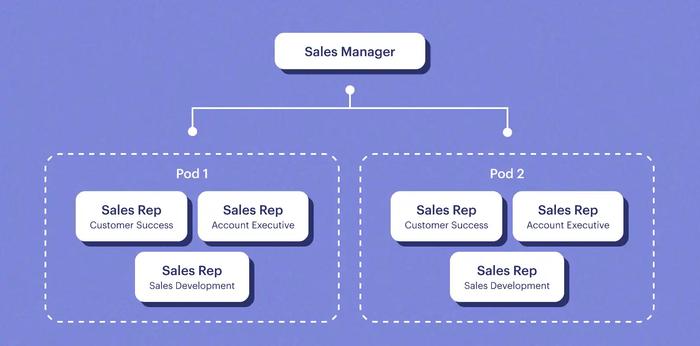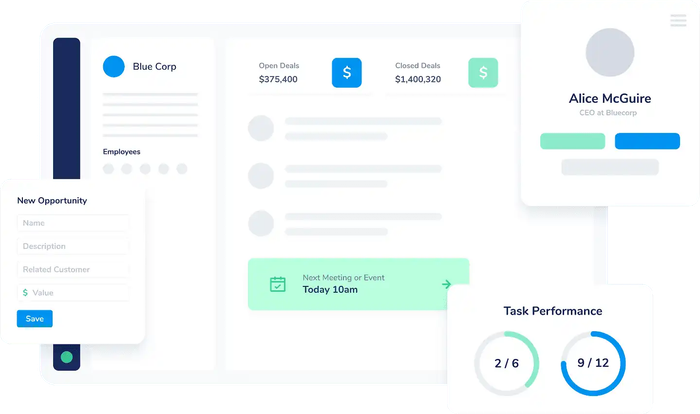Is your sales team at risk of jumping ship?
Employee retention has never been more challenging. A staggering 51% of currently employed workers say they are watching for or actively seeking a new job.
Sales leaders are facing immense pressure to keep their top talent engaged and motivated. With over half of the workforce open to leaving their current roles, the battle to attract and retain skilled sales reps has become a priority.
A sharp sales incentive and commission structure will help you retain these top performers.
Designing a sales compensation plan that keeps your reps satisfied and productive is a delicate balance. Your base salaries and commission rates need to be competitive and you need to use strategic bonuses and incentives to reinforce your broader business goals.
Together, we’ll explore what incentives and commissions are, when to use them, common challenges, and useful software.
Sales commissions vs sales incentives

What is a sales commission?
Sales commission is a reward paid to salespeople, usually a percentage of the sales they make. It motivates them to sell more by directly linking their earnings to their performance.
It's a simple idea: sell more, earn more. This setup pushes salespeople to work harder because they see an immediate connection between their effort and their paycheck.
What is a sales incentive?
Sales incentive is a broad term used to describe various rewards aimed at motivating sales teams. These rewards differ from sales commissions, which are often a fixed percentage of individual sales.
Instead, incentives may come from meeting team goals, achieving quarterly targets, beating sales records, or excelling in customer satisfaction.
They can be monetary rewards, like bonuses or profit sharing, or non-monetary, such as extra vacation days or event tickets. These rewards encourage employees to reach wider company objectives and improve the basic commission plan.
Now, why do companies like this setup? Teams with incentive programs report a 79% success rate in achieving their sales goals.
It makes sure sales teams' align with the company's goals. Say a company wants to sell a bunch of new gadgets, they can motivate r salespeople to push these gadgets by offering higher commissions or better rewards.
Also, top salespeople always look for the best deals, not just in what they sell but also in how they're paid.
A strong compensation and incentive plan can pull in the best of the best. It's a magnet for talent.
But, crafting such a program isn't easy. You've got to hit that sweet spot where salespeople feel motivated, and the company still makes a profit. Think of it like setting the rules for the game. Too easy, and it's no fun. Too hard, and nobody wants to play.
So, in short, rewards are a big deal. They motivate reps, help companies sell more, and attract top sales talent. The clue is finding that perfect balance to keep everyone happy and moving forward.
Sales incentives and sales commissions: key similarities and differences
Sales incentives and sales commissions are both useful tools for motivating sales teams, but they serve different purposes and operate under separate structures.
Similarities:
- Both serve as variable pay on top of a base salary.
- Both reward reaching specific sales goals and performance metrics.
- Both are usually paid out regularly, like monthly or quarterly.
Differences:
Purpose
Commissions directly reward salespeople for their sales volume and revenue generation. They link pay precisely to individual sales results.
In contrast, sales incentives aim to motivate broader behaviors that benefit the entire team or company. They encourage activities that go beyond just making sales, like improving customer relationships or working well within a team.
Payout structure
Commissions are straightforward. A salesperson sells something and earns a set percentage of the sale. This rate usually stays the same over time unless the policy changes.
Incentives, however, are more varied. They might include bonuses, extra time off, cash rewards, or even travel vouchers. Sales reps can’t base their income on sales incentives.
Mindset
Salespeople often view commissions as a regular part of their earnings. They expect this pay as part of selling products or services.
Incentives, though, are seen as extra rewards. They are given for exceptional work or for contributing to the team's success in ways that aren't just about closing deals.
Flexibility
Changing commission structures can upset a sales team if not managed carefully. Salespeople plan their finances around expected commissions, so sudden changes can cause stress and frustration.
Incentives offer more flexibility. Leaders can introduce new incentives or adjust existing ones without disrupting the core pay structure. This makes it easier to adapt to new business strategies or market conditions without lowering morale.
When to use sales incentives and sales commissions

Setting up your motivation plan is a strategic move that needs careful thought. The key is linking what your business wants to achieve with how you reward your sales team.
Use sales incentives when:
- You have a more mature business with a complex selling organization.
- You have well-defined account management roles, rather than pure sales roles.
- You have a solid goal-setting process and can set achievable targets for your sales team.
- There are major differences in sales volume attributable to the sales assignment, not just the individual seller's performance.
- You want to incentivize collaboration and team-based performance, rather than just individual sales results.
- You want to create a culture of continuous improvement and recognize progress towards goals, not just outcomes.
Use sales commissions when:
- You have an earlier-stage business with new sales roles.
- You are launching new products and need a strong sales push.
- You have a more straightforward sales process with equal selling opportunities across assignments.
- You are struggling to set accurate, achievable sales goals for your team.
- You want a more direct, performance-based compensation structure that scales with sales results.
However, under the right conditions, combining incentives and commissions can be highly effective.
Use both when:
- You want to directly tie compensation to individual sales performance and results, but also incentivize team/company-wide goals.
- Your sales team includes both new hires needing motivation and seasoned professionals driving higher-value sales.
- You have a limited budget and need to combine financial and non-financial rewards to motivate your team.
- You want to reward immediate results but also encourage behaviors that lead to future success, like customer retention and market expansion.
- Mixing incentives and commissions lets you motivate your team on multiple levels. Commissions get your team excited about immediate sales. Incentives push them towards strategic goals that benefit your business in the long run. This helps maintain a dynamic sales environment where short-term achievements and long-term growth go hand in hand.
Examples of sales incentives and commissions
Sales incentives and commissions are key tools in a sales strategy, each designed to motivate specific outcomes within a team.
Commissions drive immediate sales motivation
Commissions are direct payments given as a percentage of sales. They're great for quick results.
- For instance, to clear high-end stock, a company might offer a 20% commission on items selling over $10,000. For more regular items, the rate might be 10%. This setup drives reps to pursue more lucrative deals.
- Another approach is tiered commissions, which increase with sales volume, for example: 5% up to $5,000, 10% between $5,001 and $10,000, and 15% beyond. This encourages reps to make more and larger sales.
- A third example is using a sliding scale commission based on the margin of the sale. Suppose a company wants to prioritize profitability; they could set a commission structure that adjusts based on the profit margin of each sale. For example, sales with a profit margin under 10% might attract a 5% commission. Those with margins between 10% and 20% earn 10%, and sales exceeding a 20% profit margin reward the salesperson with a 15% commission.
Incentives are about broader business goals
Unlike commissions, incentives often motivate sales reps to target wider company objectives. Here are some sales incentive ideas:
- Longevity bonus: To encourage long-term client retention, you might offer a $1,000 annual bonus to sales reps who maintain client relationships beyond one year.
- Team performance bonus: You could introduce a $10,000 team bonus if the group exceeds quarterly sales targets by 30%.
- Service excellence reward: Recognizing non-sales efforts, you might provide non-monetary rewards such as a premium parking spot for a month or a top-of-the-line office chair to sales reps who receive the highest customer service ratings each quarter.
- Mentorship recognition: For senior sales reps who actively mentor new hires, you could offer additional paid vacation days.
- Product launch SPIFFs: To generate excitement and sales momentum for a new product, you might offer a $500 bonus for every $5,000 worth of the new product sold within the first month of its launch.
Common challenges of sales incentives and commissions
Handling sales incentives comes with its own hurdles. Here’s how to tackle some common ones:
Disputes over commission calculations
Sometimes, sales reps might question their commission or incentive amounts. This can lead to distrust and lower motivation.
Use clear, detailed statements that break down each sale and how much they earned. The documents should be accessible at any time. Your sales managers and reps can then retain peace of mind. When everything's transparent, disputes drop.
Data protection and validation
Protecting sales data is very important. Any leaks can hurt your business and your sales team's trust. Data mistakes can lead to huge losses.
To avoid this, invest in secure commission software that encrypts data and backs it up regularly. Also, frequently validate data to catch and fix errors early. Your software should protect you against duplicates and other errors.
Establishing fairness and transparency
If the sales incentive or commission process seems hidden or complicated, it can feel unfair to your team. They may question your transparency.
Keep your policies simple and clear. Share them with the team, and hold regular Q&A sessions for any clarifications. Your documentation should be detailed but straightforward.
Adapting to changing business needs
As your business evolves, your reward structure might need to change too. Sticking to an outdated model can hurt sales.
Instead, review your compensation and incentive plans regularly. Be ready to adjust it to fit new business strategies or sales roles.
Keeping up with compliance
Sales commission practices must comply with local and international laws, which can change over time. The same applies to sales incentives.
Stay informed about relevant laws and adjust your reward plans as needed. Consider legal consultation to guarantee compliance.
Bringing teams together after mergers
Merging sales teams from different companies is tough. You will need to reassess everything from the ground up.
Review all the old commission and incentive plans. Create a new one that takes the best bits from each. Explain the changes clearly and support your team through the shift.
Implementing sales compensation software

Sales commission software makes tracking rewards easy. Here's why it's worth it and what to look for.
Why use commission software?
- Minimizes mistakes: Goodbye manual errors. Everyone gets paid the right amount on time.
- Clear view: Sales reps can see their progress anytime. This builds trust and keeps them motivated.
- Saves time: Less time calculating, more time selling. That's better for your top sales performers.
- Quick changes: When sales plans change, software changes quickly too. Your team stays flexible.
What to look for in commission software
- Fits you: Your business isn't like others. Pick software you can tailor to your needs.
- Integrates well: It should work smoothly with your CRM and accounting tools. This means less manual work.
- Smart reports: Get insights on sales trends and team performance. Use these to make smarter decisions.
- Easy to use: If it's complicated, it won't work. Choose software that's easy for everyone.
- Grows with you: Your business will grow. Your software should too. Make sure it can handle more data over time.
Top picks for sales commission software
- Xero: A leader in the market when it comes to payroll. Integrates with Capsule CRM for deeper insights.
- Commissionly: A hit with small and medium businesses for its customisation and CRM integrations.
- CaptivateIQ: Loved for its easy design and customisable reports.
- Salesforce Commissions: Perfect if you're already using Salesforce, thanks to its tight integration.
Pick the right commission software and you'll spend less time on spreadsheets and more time hitting sales targets. It's a smart move for any sales-driven business.
Conclusion
Creating the right sales incentive program does a lot. It grows your business and keeps your sales team going. Different plans suit different needs. The core? Be clear, fair, and ready to change when needed.
Review your program often. See who's doing great and reward them. This keeps everyone eager to do more.
Also, using commission software helps a lot. It cuts down errors and keeps data safe. Plus, everyone can see how they're doing anytime. Integrate it with a CRM like Capsule, and you get a one-stop-shop solution for your sales rewards needs. Check Capsule's pricing here and register for a 14-day free trial.
Your sales incentive plan should be easy to get, fair, and match what your team and business are aiming for. Change your plan as things change in your business or the market. Pick tools that help you and talk clearly with your sales team. This way, it stays a strong motivator and a key to success.
FAQs
A sales manager should consider both team and individual performance when setting sales commission rates. For underperforming reps, a tiered commission structure can provide motivation to improve. Setting clear benchmarks and offering training and support is key to helping every team member succeed.
Fairness in a sales commission structure is ensured by linking commissions to the revenue generated by each rep. This approach motivates reps to increase their sales efforts and ensures that rewards are directly tied to their contribution, promoting a healthy competitive environment.
Yes, effectively designed sales commission structures can significantly boost team performance. By rewarding sales presentations that successfully sell products, teams are encouraged to refine their sales strategies and collaborate. This leads to improved overall results.
Common pitfalls include not clearly defining what constitutes rewardable performance and making data errors in calculations. To avoid these, confirm the commission plan is transparent and use reliable software to track sales and calculate commissions accurately.
The choice of sales commission structure greatly impacts employee motivation by affecting their income potential. Structures that reward efforts to close deals directly align with reps' goals to increase earnings, encouraging them to pursue sales more aggressively.




